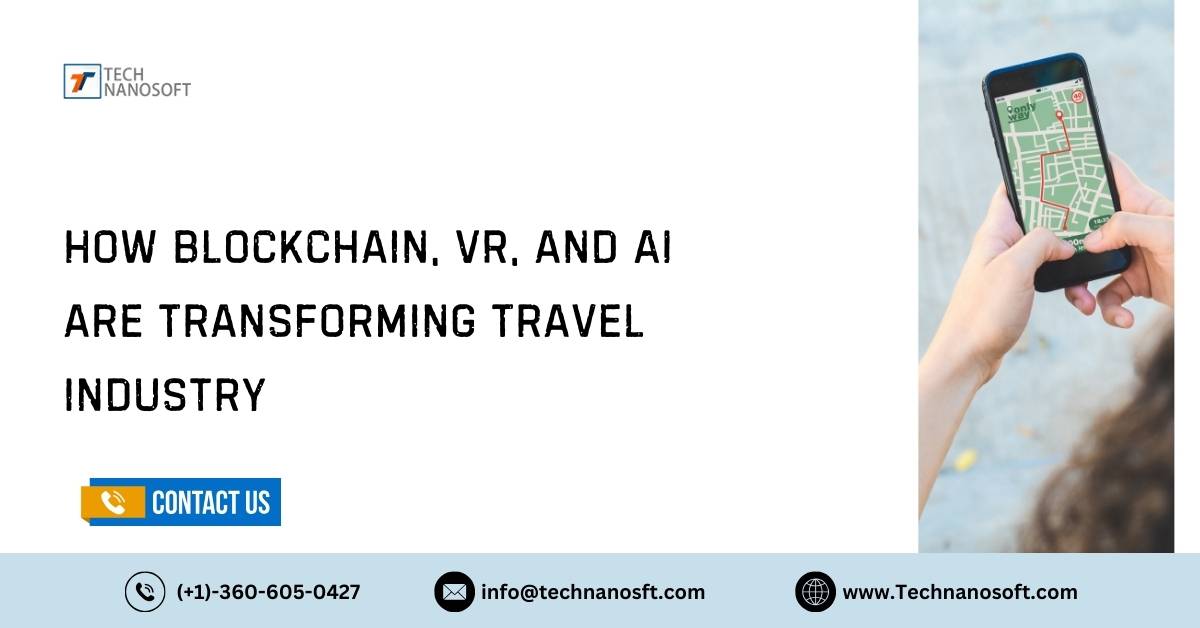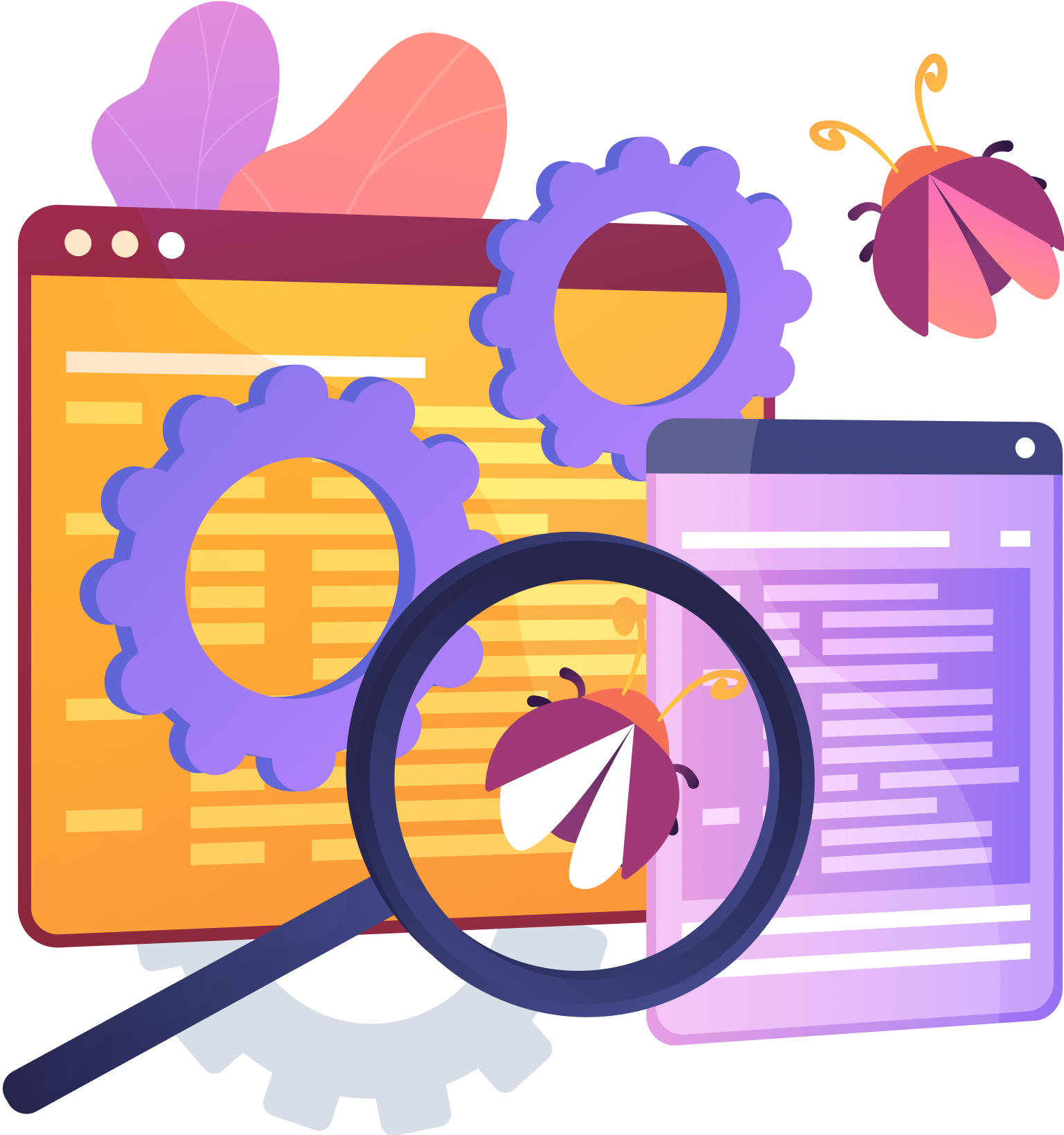How Blockchain, VR, and AI are Transforming Travel industry

The travel industry is undergoing a fundamental upheaval thanks to cutting-edge new technology like Blockchain, virtual reality, and artificial intelligence. From travel itinerary planning to on-the-ground encounters, these technologies are transforming the entire travel experience. Blockchain guarantees safe transactions and identity verification, VR offers realistic location previews, and AI-driven chatbots expedite customer support. Travelers may anticipate increasingly individualized, effective, and safe experiences as these technologies advance, bringing in a new phase of exploration and discovery in the travel industry.
The Creation of Software With Blockchain, AR/VR, and AI Technologies
The way Blockchain, AI, and AR/VR technologies are combined is completely changing the travel sector. While AR/VR transports people to virtual locations, AI-driven algorithms customize travel experiences. Transaction security is guaranteed via Blockchain. These advances promote trust, increase efficiency, and improve customer service. Travel agencies streamline operations and improve customer experiences by utilizing AI for tailored suggestions, AR/VR for immersive discovery, and Blockchain for safe transactions.
Adopting these technologies increases innovation and competition in the travel industry and presents unrivaled chances for expansion and improved client delight.
How Artificial Intelligence (AI) Is Transforming The Travel Industry
AI is completely changing the travel sector by optimizing workflows, customizing experiences, and enhancing customer support. Chatbots in travel are among the most noteworthy uses of AI. Client service can be greatly improved using these sophisticated virtual assistants, which can handle client inquiries, make hotel reservations, and offer real-time recommendations.
Furthermore, enormous volumes of data are analyzed by AI-powered algorithms to forecast travel patterns, enhance pricing tactics, and personalize trip suggestions based on user preferences. This customization boosts client satisfaction and loyalty and improves the entire travel experience.
AI-driven technologies are also improving travel safety and security protocols. For example, facial recognition technology is being used at airports to speed up the check-in procedure and enhance security screening protocols, making traveler experiences more convenient and safe.
How Virtual Reality (VR) and Augmented Reality (AR) Is Transforming The Travel Industry
Travelers' location exploration and itinerary planning methods are completely transformed by VR and AR new technologies. Before making a reservation, passengers can examine locations, lodging options, and activities thanks to virtual reality (VR). This interactive experience lowers the possibility of unpleasant shocks when arriving and empowers tourists to make better-informed selections.
Conversely, augmented reality (AR) improves the mobile experience by superimposing digital data over the real environment. AR-enabled mobile apps, for instance, can translate foreign languages into real-time, show historical information about landmarks, and assist with navigation, all of which can facilitate passenger navigation in unfamiliar locations and help them comprehend their surroundings better.
Moreover, travel agencies are using VR and AR to develop interactive marketing campaigns and virtual tours that let prospective visitors experience places virtually from their homes. Ultimately, this increases bookings and income by encouraging passengers to interact with brands more personally and aiding in destination promotion.
How Blockchain Is Transforming The Travel Industry
The travel industry is changing thanks to blockchain technology, which is travel and expense management software to transforming several areas, like loyalty programs, identity verification, and payment processing. Blockchain facilitates safe and easy transactions by removing the need for intermediaries and lowering transaction costs by offering a decentralized and transparent ledger system.
Blockchain-based cryptocurrencies like Bitcoin and Ethereum are becoming more and more well-liked as substitute payment options for reservations for hotels, flights, and other travel and expense management software. Travelers and travel agencies find these digital currencies an appealing alternative to traditional payment methods since they provide increased security, reduced transaction costs, and quicker processing times.
Furthermore, identity verification procedures are being improved with blockchain new technology, especially regarding border control and security. Travelers may securely and quickly authenticate their identities without needing laborious paperwork or centralized databases by storing encrypted biometric data on a blockchain network. This expedites the immigration procedure and strengthens security measures.
Travel trch agencies are also implementing blockchain-based loyalty programs to reward and encourage repeat business from their devoted customers. Travel agencies may provide more flexible redemption choices, do away with expiration dates, and stop fraud by tokenizing loyalty points on a blockchain network. This improves the value proposition of the programs and encourages recurring business from customers.
Tools For Language Translation Softwares
Language translation software is a priceless tool that helps visitors navigate unfamiliar nations by enabling efficient communication between speakers of different languages. The degree to which these tools' translation algorithms are sophisticated and the subtleties of the context they can understand determine how accurate they are. Though they help greatly, small details and cultural differences can still affect accuracy.
The ability of language translation technologies to accurately comprehend idioms, colloquialisms, and meanings peculiar to a given environment is a critical component of their efficacy. Even with advances in natural language processing and machine learning, these technologies might need help to grasp subtleties that need human comprehension.
Furthermore, cultural variations are crucial to the correctness of language translation. Various cultural contexts may provide different interpretations of certain phrases or gestures, making it difficult for translation technologies to transmit intended meanings accurately.
Advantages of Using AI, AR/VR, and Blockchain In Software Development
Enhanced Personalization
AI systems examine vast amounts of data to provide individualized travel tech suggestions based on prior traveler behavior and personal preferences, improving the trip experience. This technology ensures that passengers receive personalized recommendations based on their tastes for everything from lodging to activities, increasing satisfaction and engagement.
Better Customer Service
AI-driven chatbots and virtual assistants are revolutionizing customer service in the travel sector by effectively managing reservations, queries, and real-time support. By improving responsiveness and streamlining processes, these automated technologies guarantee that tourists receive accurate and timely assistance during their trip, increasing customer satisfaction and loyalty.
Immersive Experiences
By enabling virtual location research, hotel previews, and immersive attraction experiences, AR/VR technologies are revolutionizing the tourism industry. These new technologies improve decision-making and engagement by enabling tourists to virtually experience their locations before booking. This gives them a preview of what's in store and encourages confidence and excitement in their travel choices.
Enhanced Efficiency
AI-driven automation reduces human intervention and administrative responsibilities by optimizing travel-related activities, including booking, reservations, and payments. By simplifying their operations, travel tech companies can run more effectively and save time and money. This will improve service quality and the clientele's overall experience.
Enhanced Security
Blockchain technology reduces the risk of fraud by ensuring safe and transparent transactions for the reservation of hotels, flights, and other travel-related services. It builds confidence between customers and service providers. Blockchain improves security and dependability in the travel sector by offering a tamper-proof record of transactions, creating a more secure and reliable environment for all parties involved.
Cost Savings
Technologies like Blockchain and artificial intelligence (AI) help travel tech companies save operating expenses by automating repetitive operations, streamlining procedures, and enhancing resource utilization. These travel technology companies allow businesses to run more efficiently, which lowers costs and boosts profitability in a highly competitive market environment by eliminating manual labor and streamlining procedures.
Competitive Advantage
Travel agencies stand out in a crowded market by embracing cutting-edge technologies like AI, AR/VR, and Blockchain, which draw in tech-savvy clients and establish them as leaders in the field. In an industry that is changing quickly, businesses can acquire a competitive advantage by providing improved services, customized experiences, and innovative solutions. This helps with customer acquisition, retention, and loyalty.
Data Driven Insights
Travel agencies may make well-informed decisions and maximize plans for growth and success by utilizing AI-powered analytics, which offers priceless insights into consumer behavior, market trends, and competition intelligence. Businesses may find opportunities, reduce risks, and customize their products to fit changing consumer needs by utilizing data, ultimately leading to increased sales and profitability.
Sustainability
By utilizing AI and data analytics, travel agencies can adopt sustainable practices to reduce their environmental effect and help create a more sustainable future. Through efficient resource management, lowering carbon emissions, and endorsing environmentally conscious programs, businesses can satisfy consumers' increasing need for eco-friendly travel choices, cut expenses, and improve their reputation.
Conclusion
The tourism business has much potential for software development utilizing technologies like AI, AR/VR, and Blockchain. While guaranteeing security and transparency in transactions, these advances allow for increased efficiency, immersive experiences, and personalization.
Travel agencies may improve customer experiences, promote operational excellence, and obtain a competitive edge in the ever-changing travel market by utilizing AI for tailored suggestions, AR/VR for immersive exploration, and Blockchain for safe transactions. Using these technologies allows the travel industry to experience previously unheard-of possibilities for innovation, expansion, and sustainability.
FAQ's
Q.1- How does artificial intelligence (AI) function in tourism?
AI is crucial for improving customer service, expediting procedures, and tailoring travel experiences. AI boosts productivity and customer happiness with tools like chatbots that provide real-time support and predictive analytics that provide customized recommendations.
Q.2- What are the augmented reality (AR) and virtual reality (VR) implications on travel?
Travelers may enjoy immersive experiences thanks to VR and AR technology, which lets them virtually explore destinations and gather information before making a reservation. By superimposing digital data over the real world, augmented reality (AR) improves mobile experiences by facilitating navigation and offering contextual information.
Q.3- What are the advantages of using blockchain technology in the travel industry?
Blockchain guarantees safe and transparent transactions, lowers fraud, and streamlines procedures like identity verification and payment processing. Blockchain gives travel operations more efficiency and trust by utilizing decentralized ledgers.
Q.4- How do these technologies enhance the traveler experience?
Blockchain guarantees safe transactions and identity protection, VR/AR improves pre-trip exploration and on-site experiences, and AI allows tailored recommendations and effective customer service. When together, they give clients smooth, engaging travel experiences.
Q.5- Can all travelers use these technologies?
Travel agencies use AI, VR, and Blockchain differently, yet their general integration makes these travel technology companies more accessible. Travelers worldwide may now more easily use AI-driven chatbots, virtual tours, and blockchain-based payment alternatives, thanks to the availability of these technologies on numerous travel platforms.
Q.6- What effect do these advances have on travel's sustainability?
Blockchain can improve transparency in eco-friendly efforts, VR/AR can encourage virtual tourism to alleviate overtourism, and AI can optimize travel routes for lower carbon emissions. These technologies support the long-term health of the travel sector by encouraging sustainable practices.
Q.7- Can you give examples of Blockchain, VR/AR, and AI uses in the travel industry?
A few examples are travel planners assisted by AI, VR-based destination previews, AR-enhanced navigation apps, and secure payment systems enabled by Blockchain. These apps guarantee trust in travel transactions, increase efficiency and improve experiences.









